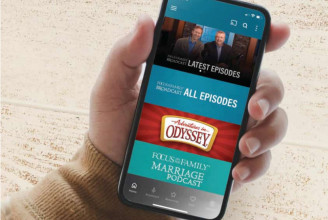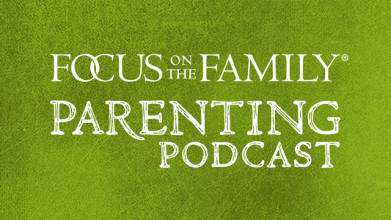Excerpt:
Amy Carroll: God doesn’t reject the foolish, the lowly and the weak. He chooses them.
Jim Daly: Yeah.
Amy: He chooses us. And he takes those weaknesses and redeems us into things that we can love.
End of Excerpt
John Fuller: That’s Amy Carroll and she’s our guest today on Focus on the Family, along with her friend and co-author, Cheri Gregory. And your host is Focus President and author, Jim Daly and I’m John Fuller.
Jim: You know, John, a common theme we hear at Focus on the Family is women feeling overwhelmed. It’s very common. Uh, as they express it, they tell us they feel the pressure of expectations, obligations surrounding home life, family, work, church, friends, and the list keeps going. Uh, I see that with Jean. I was talking to her early today and just asked her what’s an example where she has felt those things. And she reminded me of a story. She was the homeroom mom. You know, we had our boys in charter school. And she had made a commitment to do the Christmas party both for Trent’s class and Troy’s class, never realizing they were going to land at the same time.
John: Oh.
Jim: I mean, so she literally had to be in two places and then she selected a craft that was way beyond the age of either Trent’s class or Troy’s class, so they needed extra help. And she said it was just a mind-blowing experience and she felt so inadequate afterward that she didn’t realize the timing problem. The kids did not have a great experience, so she failed them and she brought that all home.
John: Yeah.
Jim: You know that burden of, “I’m terrible. How could I do this as a mother?” And there are a lot of moms, whatever that example is, I know you’re thinking of it right now.
John: Mm-hmm (affirmative).
Jim: Uh, that made you feel less than perfect. And guess what? That’s okay. You are less than perfect, just like the rest of us. And today, we want to encourage you, as a woman, to, uh, step back and take a breath of fresh air. And we hope to help you, uh, better understand who you are in Christ with our guests today.
John: And Cheri Gregory and Amy Carroll will help us, uh, understand a little bit better how to, uh, let go of things and, uh, really rest, as you said, Jim. Both have been with us here before. Amy is a writer and speaker for Proverbs 31 Ministries. Cheri is also a popular, uh, speaker and writer. And together they host the Grit and Grace Podcast. They’ve written a great book called Exhale: Loose Who You’re Not, Love Who You Are, Live Your One Life Well. And of course we have copies of that at focusonthefamily.com/broadcast.
Jim: Uh, Cheri and Amy, welcome back to Focus on the Family.
Cheri Gregory: Well, thank you so much. We are super excited to be here.
Amy: It’s great to be here again.
Jim: It’s always good to have you here. You bring such, uh, wonderful content for women who, you know, like most women, are just struggling with something. Right?
John: Mm-hmm (affirmative).
Jim: And, uh, this is a great book, Exhale. Jean, in fact, was able to flip through it. She’s looking forward to reading it. But it really touched her heart. I think you’ve got a great message here for women. Uh, you’re both speakers with a mission to encourage women. Um, what are you hearing from the ladies you talk with? I mentioned what we’re hearing here at Focus. What is the pressure or some of the pressures, examples of that pressure that they’re feeling?
Amy: We hear from so many women who are… They might be like us… Who are, they feel like they’re suffocating under the pressures of being all things to all people.
Jim: Has it always been that way, I mean, really?
Amy: I think it has been to some degree. Women have always worn a lot of hats. But I think social media has amped it up. What about you, Cheri?
Cheri: Absolutely, absolutely. And I think, you know, one of the things that we feel strongly is that they, they desperately want to love their people well. They want to bring glory to God. And then they have these desires in their heart that they’d like to fulfill but they feel like they have to pick two out of the three. Like there’s no possible way they could do all three. And so you can guess the one that gets shifted aside. Of course, they’re going to try to bring glory to God. Of course, they’re going to care for their family. And so the desires of their hearts feel almost selfish.
Jim: Yeah.
Cheri: To even think about.
Jim: You paint a picture in the book about that woman who’s waking up at two in the morning. I think you used the 2:37-
Cheri: That’s right, 2:37.
Jim: What’s the significance in that? But whoever’s waking up at 2:37, please write or call us. But you have that picture of that woman in mind, waking up in the morning stressed out, at 2:37. Um, describe what that is getting at.
Cheri: You know, she’s managed to fall asleep and then her brain wakes herself, wakes her up. And it’s like a… you guys remember that scene in, um, I Love Lucy, of Ethel and Lucy at the chocolate factory?
Jim: Oh, that’s the one.
John: Yeah.
Cheri: And the chocolates, the conveyor belt just keep coming. And that’s what’s going on in her head. The thing that’s important about, about this conversation is we’re not necessarily talking about external pressures. We’re talking about those internal pressures that just keep mounting. And she has to pick up the dry cleaning. And she has to do this for the kids and this at work, and this, and this, and this, and ahhhh. And she can’t get back to sleep and she’s wondering what is she doing wrong. What’s wrong with her? Where has she failed?
Jim: Yeah.
Cheri: And she’s trying so hard to do so much good.
Jim: You know, this is, uh, not a book question, uh, but it’s one that’s always, um, kind of circulated in my mind about men and women and the differences. And I’ve said this often. But women seem to, um, own the burden of failure much more than men. I mean, men, it’s, “Oh, it’s the other guy’s fault.” I think it might be our pride and ego that gets there and it saves us (laughs) to one degree from owning stuff. But with women, it’s just, they always seem to look to their own faults first. And it’s an amazing capacity but it can be debilitating if taken to an extreme. Right?
Amy: Well I agree with that. I think that it springs out of some of our greatest strengths. We’re, we are created in the image of God and we reflect his image in the way we love people, we nurture people, we take on responsibility for the people around us, whether it’s our neighbors or our family members or the people we work with. And we care so much and that’s a wonderful thing.
Jim: It is.
Amy: But it can be our biggest downside too when we start to shoulder all of that in our strength and we don’t live what Cheri and I call the examined life. Uh, our tendency, as women, I think, a lot of times is just to say yes.
Jim: Boy, is that true.
Amy: And I think our culture encourages that and I actually think our churches encourage that.
Jim: Because a really good woman is going to always say yes. Right?
Amy: Exactly.
Jim: Yes to everything.
Amy: The good Christian woman.
Jim: Yeah, wow.
Amy: Definitely says yes to everything. Right? Well scripture doesn’t really reflect that truth and so we dug into that and we found some freedom in the process.
Jim: That’s fantastic and that’s what we’re going to dig into. Let’s move to that practical help, that you encourage women to lose, love, and live, which sounds great. It may be a title to a movie. But what kinds of things should she lose, for example? It sounds interesting. (laughs)
Amy: Well, we have found that the first step… And Cheri really came up with this concept… That it is, it’s step by step that we begin to live our one life well. First, we have to lose who we’re not. I’ve started thinking about our minds and our hearts as an episode of Hoarders. For a lot of women, we have such clutter that there is no room to actually live the life that God has created us for and called us to.
Cheri: Mm-hmm (affirmative).
Jim: So, when you lose something, h- how do we get to the point, how do women get to the point where it’s okay? It’s good to lose something. Because it, I’m sure it feels counter intuitive.
Cheri: Oh, it feels, it feels terrible. I mean, for, fir- first of all, humans are loss averse. We don’t like the idea of losing anything. But, you know, I love helping. I love helping, e- even when people don’t know they need help, I’m a specialist at diving on in and being a problem preventer. And they should be so grateful for me showing up and seeing so far in advance that I can just swoop in and save the day. And it turns out, most of the time, they’re really irritated with me. And they don’t recognize problems the way I do. And so, you know, I, I used to think that this meant it was a special gift from God. Well, actually the name for that is meddling. When I haven’t been asked to step in and help and actually sometimes, I would prevent the consequences that needed to happen so they could learn.
Jim: But at the core, Cheri, i- i- it’s giving you a feeling of worthiness.
Cheri: Oh my goodness, yes.
Jim: You feel good about doing that. And, and that’s got to be-
Cheri: You’re on to me, Jim. (laughs)
Jim: No, I mean, I see it in Jean again.
Cheri: Yeah.
Jim: But the, there is that pull that you feel a certain self-worth-
Cheri: Yeah.
Jim: From stepping in and fixing a problem.
Cheri: Mm-hmm (affirmative).
Jim: Doing the right thing, having the right answer.
Cheri: Mm-hmm (affirmative).
Jim: And we also suffer from that to a degree. But, but how do you keep it in that healthy place and not the intrusion place?
Cheri: You know, what we’ve discovered e- especially, well I’ve discovered, especially in our collaboration, is when we’re working together on a project, we have given each other permission to speak into each other’s lives, to speak into the project. And that stays on above board. We have boundaries around it. It’s really healthy. What I just described is like one day my husband decided he was going to make blueberry pancakes. I decided to stay in the kitchen and watch him.
Jim: (laughs)
Cheri: So I faked… I feigned. I’m like, “Oh, I’ll make an apple crisp.” I did not need to make an apple crisp. And I’m, I’m busy making the apple crisp while keep, keeping an eye on him because he’s doing everything wrong. I’m biting my tongue and I’m like, “When did-”
Jim: Okay, this is pancakes, ma’am. I’ve got to talk to your husband.
Cheri: Blueberry pancakes. He rinsed-
Jim: Come on, well that’s really hard. (laughs)
Cheri: He rinsed the blueberries in hot water, guys. I’m sorry. It was going to turn everything an ugly shade of blue.
John: I can’t believe he would do that.
Jim: Why would he do something like that?
Cheri: And he had the temperature too high. And I’m watching him and I’m just, I’m like ready to jump in and save him if he even, you know, looks my direction. And he leaves the room. And I check… And he’s burning the pancakes. Okay?
Jim: (laughs) That’s, that’s a talent. Let me tell you.
Cheri: But I come back to my apple crisp and in my f- hyper-focus on his stuff, I’ve added… You know how apple crisp has an oatmeal, brown sugar crumble on top?
Jim: Sure.
Cheri: I’ve thrown all the oatmeal in with the apples and they’re now the consistency of glue. You know, all the oat gooey-ness and it takes me 20 minutes to clean up my mess. And it was one of those moments where I went, “I just caused myself a ton of work. My husband ate his pancakes. He was fine. He did not have a problem.” I saw a problem that didn’t exist, and I jumped in and there was no need.
Jim: I don’t know. Burning pancakes would be a problem.
Cheri: He was fine with it.
Jim: I don’t think my kids would eat those, but (laughs)… But I get the point.
Cheri: Did he ask for help?
Jim: Yeah.
Cheri: He didn’t need the help. I was, it was meddlesome me jumping in that day.
Jim: All right, let me ask that obvious follow up question, especially in marriage when you have that kind of thing going on. Let’s say, okay, uh, a wife is recognizing, “Wow, what Cheri just said is so true. I tend to, uh, intrude into the problems my husband might be experiencing rather than be invited in.” Again, how do you manage that? Do you, “Hey, honey, uh, do you need some help from me?” How do you broach that subject without irritating him?
Amy: Well, I’m going to set Cheri up for this. Because I say that the best page in the book is the, where she made a chart on the difference between helping and meddling. And listen.
Jim: And you shared that with your husband?
Amy: (laughs)
Jim: No, no. Okay, good, this was just between the two of you.
Amy: I’ll go back and look at it.
Cheri: I have it copied.
Jim: This is girlfriend accountability.
Cheri: Yes it is.
Jim: Okay, good.
Cheri: Well, I have it copied on my, and put on my refrigerator, especially not only in marriage but in our interactions with our adult sons and daughters that this is really important. I said, “I really should have it tattooed on my arm.” You know, that little part?
Jim: (laughs) Don’t do that.
Amy: So tell us some of the things on that chart, Cheri.
Cheri: Well, let me do the caveat that I’m not talking about when you are actually in a role of advocating for somebody who can’t advocate for themselves.
Jim: Yeah, very different.
Cheri: And I’m not talking about early parenting. But I’m talking about people who are perfectly capable of taking responsibility for themselves. So helping is by invitation. And let me tell you. My husband never asks for help. So that’s why I was constantly jumping in. But meddling is by invasion. So yes, I would invade. Insert myself where I didn’t belong. Helping is going to ask and it’s going to be respecting the other person whereas meddling is going to assume and presume. And like I said earlier, it’s going to prevent some of those necessary consequences, especially with our adult kids, that they need to learn for themselves. And, you know, when it came down to it, I just didn’t want to expect, experience the pain of those natural consequences. I wanted to prevent them in the first place. I, I’m not a problem solver so much as I am a problem preventer.
Jim: Right.
Cheri: But it prevents a lot of learning along the way.
Jim: Yeah. And, and, uh, control issues can be found-
Cheri: Yes.
Jim: In that arena. Amy, uh, let me ask you to describe, uh, the different between a fixed mindset and a growth mindset. Again, a topic that you use in the book, what’s the difference?
Amy: Well, Cheri and I both describe ourselves as reforming perfectionists. But th- it applies to anybody who feels like they have to be all things to all people. And a fixed mindset says that I either do it right or do it wrong. And if I do it wrong, it’s the worst thing ever. But a growth mindset says little failures along the way lead to growth and a better life. And what we have found is that the scariest thing for a woman who feels like she doesn’t love her life anymore and she wants to change it, the thought of trying to change and not being able to, is terrifying. And so that’s what keeps-
Jim: Crippling.
Amy: Yes, it keeps so many of us paralyzed and stuck where we are. But there is good news because God not only made our brains for change… We’re kind of brain science geeks. We’re both former educators… That he made our minds… They’re, they have neuroplasticity. We are created, literally, by God for change. And that he doesn’t make us so that we have to do the change on our own. He gives us Jesus empowered change.
Jim: Hm.
John: And you can find out more about that when you get your copy of the book by Amy and Cheri. It’s a really terrific book. It’s called Exhale, Lose Who You’re Not, Love Who You Are, Live Your One Life Well. And we’ve got that at our website. That’s focusonthefamily.com/broadcast. Or you can call 800, the letter A and the word FAMILY.
Jim: Let’s get to the Love Who You Are, uh, portion of the book. Uh, why do women have such a tough time loving who they are? And some Christians will say, “Well, that, that sounds, y-”
Cheri: Yes.
Jim: “Not correct to love myself.” It’s antithetical to our faith because we’re sinners.
Cheri: Yes.
Jim: Saved by grace, given by God, so we love God, but we don’t love ourselves. Unpack that for us.
Cheri: You know, Amy and I have both done this separately when we’ve spoken to groups of women, where we’ve, um, asked them to make a list of their weaknesses. And if you ask a group of women to do that, you will hear pens scratching furiously.
Jim: (laughs)
John: You’ve got to give them a time limit. Right?
Cheri: Yeah, they want more paper.
Jim: Yes.
Cheri: I mean, it g-, it’s crazy.
Jim: Okay, are you going to say this now, when you do it for men? What do you hear?
Cheri: Um, we don’t speak to men.
Jim: People start talking right away. I, I, I’m not sure I have many of those.
John: I’ve got one, I think.
Jim: What weakness do I have? I can bench 200 pounds, so I mean. I, I’m sorry. I’m being a little belligerent toward men.
Amy: No.
Jim: Don’t write us or email us. I get it.
Amy: (laughs)
Jim: I’m being funny.
Cheri: But then if we turn the tables and say, “Okay, now make a list of your God-given strengths.”
Jim: Hm.
Cheri: You will hear crickets.
Jim: Wow.
Cheri: Chirping. And so we aren’t saying don’t, you know, ignore your weaknesses. Okay? That, that’s not the message at all. But one of the things that we really wanted to do in the book, in this section on L- Love Who You Are, is say, “Spend some time really embracing who God did, in fact, create you to be.” Get to know who that person is. I spent so long trying to shore up my weaknesses, you know. And when I went through and looked at the story of Jesus feeding the 5,000 again, and, and what do they bring to Jesus? They bring this little hand full of weakness (laughs), five loaves and two fish, fishes. How far will this go among so many? And that’s, I think, how women are feeling at 2:37 in the morning. How far can one of me, with all my frailties, go among all of these needs? And so, what women like us do is we go to Barnes and Noble and we buy out the self-help aisle.
Jim: Yeah.
Cheri: And we try to shore up our weaknesses and we hyper focus on those weaknesses. And we try to be like other people. And when we hand our weaknesses over to God, he’s the one who transforms them. And when we trust him to be the one that we are following and that, that he made us, on purpose for his purpose, and so whatever those strengths are that he gave us, it’s okay to focus on those. Not as a way to say, “Look at me,” but as a way to glorify him. That being who he created us to be is actually an act of worship.
Jim: Yeah.
Cheri: And to try to be somebody else or to be so apologetic, “No, no, no,” we, we have recognized as false humility.
Jim: Yeah.
Cheri: We can spend so much time trying to wallow in those weaknesses rather than standing up and saying, “Yes, God made me.” You know, I’m a researcher.
Jim: Yeah.
Cheri: I’ve actually come to embrace being a researcher and Amy has the gift of the gab that God is using in amazing ways.
Jim: Amy, let me ask you this in that context, what Cheri’s just described there. When you hear somebody, hopefully your husband, let’s get it to an intimate example, where he says, “Do you know how much God loves you?” How did you react to that 10 years ago and how do you react to that today? God loves you.
Amy: That’s interesting. I’m glad you put a time frame around that because let me tell you how I r- even hearing you say it, I had this visceral reaction. Right?
Jim: Isn’t that amazing?
Amy: Sitting right here. And I teared up.
Jim: Yeah, I saw it.
Amy: And I’m willing to receive that because God’s done such a work in me. 10 years ago, I dare say I probably would’ve had a different reaction and I might have even started listing all the reasons he really shouldn’t.
Jim: That’s where you would go?
Amy: Yeah.
Jim: Well, there’s women listening-
Amy: But God’s done a transformation.
Jim: Yeah.
Amy: It’s possible to step into this woman God created that he loves so much. As Cheri said, I love how David said, “I praise you because I’m fearfully and wonderfully made.” If David had just said, “I am fearfully and wonderfully made.”
Cheri: Mm-hmm (affirmative).
Amy: That’s just arrogance. But he says, “I praise you.” So, he gave credit to his creator. And if we will do that, too, we can step into this beautiful place of loving ourselves because are so deeply loved.
Jim: And again, everybody, I think, to a degree, struggles, uh, women, men, with that. But ag- I think women struggle a bit more.
Amy: Hm.
Jim: Because of the self-doubt and the selfself-loathing that occurs.
Cheri: You’re right.
Jim: That I’m not good enough, that I didn’t do the Christmas party right. And, uh, Cheri, you talk about a story where your mom took you to, to meet someone or to hear someone speak.
Cheri: Hm.
Jim: Y- Y- you said, uh, story, because I think it describes what we’re talking about to a degree.
Cheri: Yeah. You know, when I was 16, my mother went to hear Florence Littauer speak on the four personalities. And she came home, and she gave us all a personality test and her worst fears were confirmed, that she was the only sane human being in a house full of crazy people.
Jim: (laughs) It may have been rigged. (laughs)
Cheri: (laughs) She was actually pretty much right. But she took me to hear Florence the next day. And, you know, I was, I was awe struck by Florence and she was such an amazing communicator. And what I, I wanted to be just like her when I grew up, just like her. And what I discovered is what starts out as an ideal, like it, it was okay to say, “Well, you know, I, I gained so much. God worked so powerfully through her,” but then to idealize another person, I think this is what happens with women, is we end up putting people on pedestals. We idealize them. And we don’t realize how quickly an ideal can morph into an idol.
Jim: Huh.
Cheri: And so, it was really important for me to realize I can admire, I can appreciate Florence. I could, I could receive all of the, the teaching she had. But then for me to really respect her teaching, I needed to embrace my actually personality.
Jim: Yeah.
Cheri: And the person that God created me to be and let her be herself and me be myself.
Jim: And that touches on this, uh, other area, again, that, that Jean helped illuminate for me. If, if the two things Jean has always struggled with is over-commitment, saying yes too much, and then failing at it, and then beating herself up that she didn’t perform at the level she set for herself. The other is that comparison trap.
Cheri: Yes.
Jim: And that’s kind of what you’re describing.
Cheri: Yeah.
Jim: Right?
Cheri: Yeah.
Jim: The, the idea that, especially with social media today, the comparison trap is horrific.
Cheri: Mm-hmm (affirmative).
Jim: You know, my kid’s party wasn’t quite like Betty’s, you know, or whatever. Um, how, how do you get out of that trap, Amy?
Amy: Well, I think we start to embrace our quirks as perks. And I know that sounds-
Jim: Quirks as perks, okay, get-
Amy: Quirks as perks.
Jim: It sounds like a coffee thing. (laughs)
Amy: (laughs) Well, Cheri and I have given each other superpower names.
Jim: (laughs)
Amy: She, she’s Nerdy Girl who loves to research.
Jim: All right, I love it.
Amy: And I’m Wordy Girl because-
Jim: You’re Wordy Girl.
Amy: I have even more words than the average woman in me. And for a long time, I felt ashamed of that. But when I started realizing that the power of words and how we can overuse words, then I felt ashamed of that. On my third trip to India, I saw an example of how God can turn our quirks into perks, that really changed the way I thought about that. We got to meet a man named Raju. Raju, early in his life, was orphaned and he went into a city to try to survive and ran into the worst of the worst. Every abuse that you can imagine, Raju suffered. But Raju had this thing in him, this thirst for justice. But he connected with the wrong people and it landed him in jail through protesting and violence. Turned out that that jail was the best thing that ever happened to Raju because he heard the Gospel there and he accepted Jesus. Well, Raju literally lived in a tent made of trash. All the things he had picked out that he could piece together to make a large tent, he had. But Raju was, he had taken that thirst for justice and done great good for his people there. He was a leader. And in that tent, our group was there. Raju led a worship service that I couldn’t understand a word of but I found myself weeping. And I realized that God had made a tabernacle out of that tent made of trash. That it was the most tangible presence of God that I had ever felt before. God had redeemed his quirk of this justice thing that got him in trouble and turned it into his greatest strength for God’s glory in this community. And he can do the same for us. God doesn’t reject the foolish, the lowly and the weak. He chooses them.
Jim: Yeah.
Amy: He chooses us. And he takes those weaknesses and redeems us into things that we can love. So Nerdy Girl and Wordy Girl.
Jim: That’s a beautiful story. Yeah. No, that’s beautiful. I love that redemption aspect of what the Lord does for us. Cheri, we’re nearing the end here. But, uh, part of your testimony, your story, is that you had an eating disorder. Uh, Focus gets, you know, quite a lot of, uh, emails and phone calls from women, particularly, who are struggling with that. And this happened, I think, just after high school for you. Right.
Cheri: Mm-hmm (affirmative).
Jim: Um, for those folks, particularly, or for anybody that’s battling, uh, you know, that hidden secret thing, um, how did your relationship with God change that? And how did you get free of that?
Cheri: I was actually in an eating disorder unit for six weeks. And this was back in the ’80s when they really didn’t know what to do with us. You know, there, there, there was all sorts of attempts at therapy and stuff. And I think I left and I, I had a slight awareness that I had a problem. I mean, I remember when I was, um, I was admitted. The doctor was telling my parents, “Well, anorexia nervosa is, uh, attempting to commit suicide slowly.” And I was like, “I’m not trying to kill myself.” And it was one night after a very difficult family therapy session… And I say difficult because they wanted me to share my emotions with my parents. And I’m like, “Oh, no. We’re a family of thinkers, not feelers. So that’s not going to happen.” And I went back to my room and I, I was going to read myself to sleep out of my Bible. But I got into Psalms 18 and it talks about the cords of death being wrapped around me and the coils of, like, destruction and the grave. And I suddenly… That was the moment I realized, “Hang on. I am dying.” And what happened at that moment was that God rescued me, uh, from the eating disorder. But he also offered me refuge, rescue and refuge. And what I only now realize is that I said yes to rescue but I said no to refuge. I felt like I had to then take care of myself after that.
Jim: Hm.
Cheri: And I think that’s something that many women fall into, is feeling like, “Okay, God does the saving.” But, and I think this is where the pressure comes from. This is where that sense of failure comes from. God saves. God rescues. But the rest is up to me. And to realize that no, actually, the more I think I need to do, the more I actually need to pull back and take refuge in God. Because then he’s going to be the one who says, “Yes, this. No, you don’t need to do that. Yes, you can say yes to that because that’s something of me. But no, all of these requests, those are all to make you feel better. Those are all about control.”
Jim: Yeah. And, you know, I’m thinking of that woman that’s been listening and she’s saying, “I’m living in this. This is where I’m at. But how do I step back and hear the voice of God in my life to say yes this, no that?” Understandably, you’ve lived it, so you’re saying it as if you can do this, which I know you can. But how does that woman who’s been struggling with that, do this? What help can you give her?
Amy: It’s simple, but not easy, that we prioritize time with God. Stillness, study, silence, really taking time to hear his voice and live that examined life. That we don’t have a knee jerk yes. That we go to God first and seek that refuge that Cheri talked about.
Jim: Yeah, that is so, so good. Man, Amy and Cheri, the time has flown by. That usually means we’ve enjoyed our conversation together. And I think this is such good help for that broken-hearted woman who has just been so rough and tough on herself. And I hope, uh, you’ll get a copy of the book. In fact, uh, connect with Focus on the Family. Give us a call. Go to the website. If you can make a gift of any amount, uh, we’ll send you a copy of Amy and Cheri’s book, Exhale, as our way of saying thank you. And let me tell you, um, you know, knowing these two women and the fact that they’ve poured their heart into this, uh, great book, if you can’t afford it, just get a hold of us. We’ll find a way to cover the cost of that. There are going to be others, uh, supporters here at Focus that want to do that for you. So don’t hold back. This is a great tool to give you that help that you need to get to a better place. And that’s what we’re about here at Focus.
John: Yeah, and we’re a phone call away. Our number is 800, the letter A and the word FAMILY. Or stop by the website to get your copy of Exhale: Lose Who You’re Not, Love Who You Are, Live Your One Life Well, written by our guests Amy Carroll and Cheri Gregory. You’ll find it at focusonthefamily.com/broadcast.
Jim: Amy and Cheri, uh, thank you so much for being back here at Focus. It’s been great.
Cheri: Thanks so much for having us.
Amy: It is always a delight.
Jim: It’s so much fun.
John: And, uh, we thank you for joining us and invite you back on Monday after, hopefully a good weekend with your family and your church family as well. We’ll be hearing from Dr. David Anderson. He’ll offer some encouraging insights about how we can all bridge the racial divide.
Teaser:
Dr. David Anderson: And if I would stand with you when you’re going through struggles, and you would stand with me when I’m going through struggles, we wouldn’t have division.
End of Teaser
John: On behalf of Jim Daly and the entire team, thanks for joining us today for Focus on the Family and, uh, we’ll see you here next time as we, once more, help you and your family thrive in Christ.





















